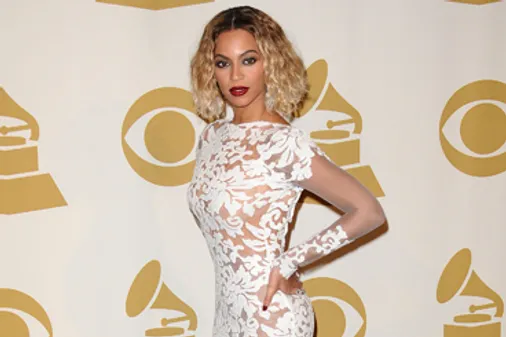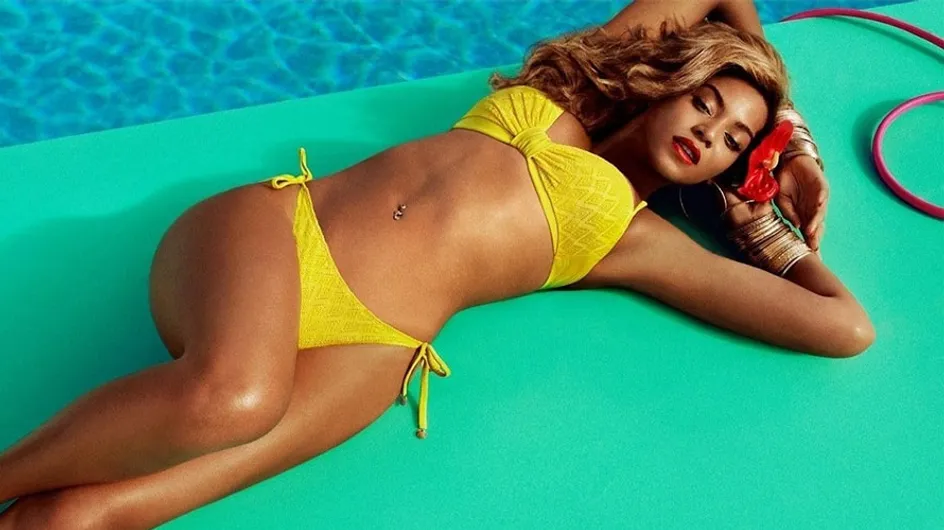Well apart from a hell of a lot of hard work and sweat, Beyonce’s new mega-toned, slim, and damn fine curvy figure is down to switching up her eating habits and following a vegan diet.
As well as getting told to amp up her running and dancing by her personal trainer, Marco Borges, Queen Bey has been following an intense 22-day Vegan day cleanse with husband Jay-Z. Reportedly, Jay-Z and Bey decided after his 44th birthday, to go on a 22-day cleanse eating nothing but fruit and plants with snacks like edamame beans and cucumber.
Reportedly the couple have lost a whopping 100lbs together (um where from!?!), with Beyonce losing 70lbs over the last 6 months. In fact, she’s lost so much now that Michael Costello, who designed her dress for the Grammy’s Red Carpet, said that she’s a UK size 6 – Beyonce, the Queen of bootilicious curves is now a 6, it’s utter madness.
So what is a vegan diet? Is it safe? We got the low down on Beyonce’s slimming secret.
What is a Vegan diet?
A vegan diet is one which is purely plant based – no meat, fish or poultry is allowed. You might think that sounds like a vegetarian diet, but vegans take it one step further by not allowing by products of animals like eggs, honey or dairy either.
Instead a vegan diet consists of mainly fruit, grains, vegetables, leafy greens, legumes, nuts and seeds. It might not sound that fun but living on a vegan diet has become increasingly popular, especially for people with food intolerances to dairy.
There’s been a virtual explosion of vegan cookbooks, blogs and alternative foods so you should have no problem getting inspiration for what you’re eating.
Why go Vegan?
For many, going vegan is down to a desire to eat more naturally or but many people make the decision to go vegan to fit in with their beliefs about environmental issues and animal rights.
But for a whole lot of people, it’s just about eating a more natural, healthy diet without the processed foods, which have overtaken modern day living. As a result, weight loss can be pretty dramatic!
 © Getty
© Getty
What are the health benefits or risks?
So when Bey and Jay-Z set out on their 22day challenge it was as much mental as physical, but this was for only 22 days. If you’re going to follow a vegan diet you do have to be careful.
A lot of the nutrients found within meat and other essential vitamins and proteins are significantly reduced in a vegan diet. So you need to make sure you include the following in your daily diet: protein, Vitamin B12, Iron, Omega 3, Amino acids, Calcium and Vitamin D.
However, the big plus point and the reason why so many people do follow a vegan diet is because the amount of saturated fat found in your diet is greatly reduced. This means directly related health issues like high cholesterol, diabetes, high blood pressure and heart disease are more preventable.
There’s also the fact that big less saturated fat equals less overall body fat. Big win.
The only thing that can be a bit of a pain is eating out, unless you're in areas like London or Brighton, vegan options in restaurants can get pretty bleak. There's also the fact that it can get expensive - all that fresh fruit and veg doesn't have a long shelf life. But it does seem a small price to pay.
Tips on getting a balanced vegan diet
Vegan diets are very restrictive and followers should keep a careful eye on their nutrition to avoid any danger. Vegan diets, followed carefully to ensure a good balance of essential vitamins and nutrients, are perfectly healthy for children, pregnant women, breastfeeding women and adolescents.
However to avoid deficiencies that could damage the body, make sure you are getting enough of the following in your diet:
- Protein - Protein from plants is incomplete, so it's vital to eat cereals/grains and pulses at every meal to get all the essential amino acids the body needs.
- Vitamin B12 - This vitamin, which is vital for red blood cells, isn't found in any plant produce, so it's vital to get plenty of good sources of B12 from foods that contain lots of it (yeast and soya or rice drinks) or even take supplements.
- Iron - The iron you get from pulses, tofu and whole grains and cereals is less well absorbed by the body than iron from animal sources, so vegans need plenty of Vitamin C (which aids the absorption of iron) and should limit their intake of tea, which has the opposite effect.
- Vitamin D - Vegans should eat plenty of foods containing lots of this essential vitamin (it is found in mushrooms and added to some cereals, yoghurts and other foods) or take supplements to avoid deficiencies.
- Calcium - In the absence of dairy produce, vegans should drink vegetable drinks (almond and soy milk, for example), which contain lots of calcium, drink high-calcium mineral water and get plenty of high-calcium fruit and veg (cabbage, broccoli and citrus fruit) into your diet.
- Omega 3 - Plant oils and nuts (walnuts, hazelnuts and almonds, for example) should compensate for the absence of oily fish in a vegan diet, as long as they're eaten regularly.
So what do you think? Tempted to try vegan living? Vegan already and loving it? Tweet us at @sofeminineUK.














